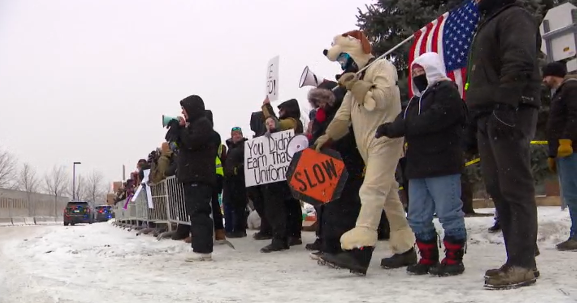US Supreme Court Won't Stop Restrictive Texas Abortion Law, But Says Clinics Can Sue
WASHINGTON (CBSDFW.COM/AP) — The Supreme Court is allowing Texas' new restrictive abortion law to remain in effect, but ruled that abortion providers can sue over the state's ban on most abortions.
The court acted on December 10, more than a month after hearing arguments over the law that makes abortion illegal after a fetal heartbeat is detected in an embryo. That's around six weeks, before many women even know they are pregnant. There are no exceptions for rape or incest.
The Texas law has been in place since September 1.
The outcome is at best only a partial victory for abortion providers. The same federal judge who once blocked the law almost certainly will be asked to do so again. But then his decision will be reviewed by the 5th U.S. Circuit Court of Appeals, which has twice voted to allow enforcement of the abortion ban.
After the Friday ruling Amy Hagstrom Miller, with Whole Woman's Health and Whole Woman's Health Alliance, issued the following statement:
"Finally, we have hope for an end to this horrific abortion ban. The legal back and forth has been excruciating for our patients and gut-wrenching for our staff. We've had to turn hundreds of patients away since this ban took effect, and the Supreme Court's refusal to block the law means the heartbreak doesn't end. Texans deserve abortion care in their own communities. Our fight against this law is not over, and Whole Woman's Health is here for the long haul. We hope this law is blocked quickly so we can resume the full scope of abortion care we are trained to provide."
But, the case could return to the Supreme Court and so far there have not been five votes on the nine-member court to put the law on hold while the legal fight plays out.
The court's conservative majority also seems likely to roll back abortion rights in a Mississippi case that was argued last week, although that decision is not expected until the spring.
The high court ruling came a day after a state court judge in Texas ruled that the law's enforcement, which rewards lawsuits against violators by awarding judgments of $10,000, is unconstitutional yet left the law in place.
The court fight over the Texas law is focused on its unusual structure and whether it improperly limits how the law can be challenged in court. Texas lawmakers handed responsibility for enforcing the law to private citizens, rather than state officials.
The law authorizes lawsuits against clinics, doctors and anyone who "aids or abets" an abortion performed after cardiac activity is detected in the fetus. That's usually around six weeks of pregnancy before some women even know they are pregnant.
The case raised a complex set of issues about who, if anyone, can sue over the law in federal court, the typical route for challenges to abortion restrictions. Indeed, federal courts routinely put a hold on similar laws, which rely on traditional enforcement by state and local authorities.
Another issue is whom to target with a court order that ostensibly tries to block the law. Under Supreme Court precedents, it's not clear whether a federal court can restrain the actions of state court judges who would hear lawsuits filed against abortion providers, court clerks who would be charged with accepting the filings or anyone who might some day want to file a lawsuit.
Since the Texas law took effect in September, it has imposed the most restrictive abortion curbs in the nation since the Supreme Court first declared a woman's right to an abortion in its 1973 Roe v. Wade decision.
In its first month of operation, a study published by researchers at the University of Texas found that the number of abortions statewide fell by 50% compared with September 2020. The study was based on data from 19 of the state's 24 abortion clinics, according to the Texas Policy Evaluation Project.
The justices declined to block the law once before, voting 5-4 in September to let it take effect. At the time, the three appointees of former President Donald Trump and two other conservative colleagues formed the majority.
(© Copyright 2021 CBS Broadcasting Inc. All Rights Reserved. The Associated Press contributed to this report.)







